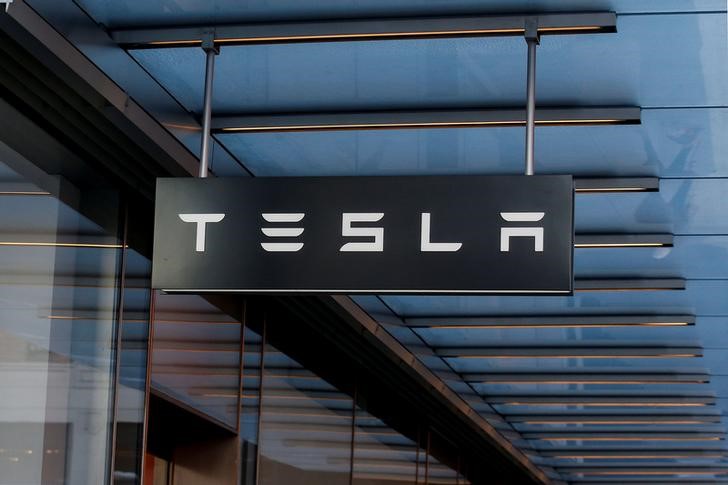By Akash Sriram
(Reuters) – Tesla (NASDAQ:) reported its first decline in annual deliveries on Thursday, as the automaker handed over fewer-than-expected electric vehicles in the fourth quarter and incentives failed to boost demand for its aging line-up of models.
Shares of the company fell about nearly 6%, indicating investor worries over the challenges facing CEO Elon Musk, who expected promotions including zero-interest financing to power a “slight growth” in deliveries in 2024.
Reduced European subsidies, a shift in the U.S. toward lower-priced hybrid vehicles and tougher competition especially from China’s BYD have pressured Tesla.
In response, Musk pivoted Tesla to self-driving taxis and backed President-elect Donald Trump with millions of dollars in campaign donations in hopes that it could bring regulatory relief for the company.
Tesla handed over 495,570 vehicles in the three months to Dec. 31, missing estimates of 503,269 units, according to 15 analysts polled by LSEG. It produced 459,445 vehicles in the period, down about 7% from a year ago.
Deliveries for 2024 totaled 1.79 million, 1.1% lower than a year ago and below estimates of 1.806 million units, according to 19 analysts polled by LSEG.
That was ahead of rival BYD, which reported a 12.1% rise in sales of sales of battery-electric vehicles to 1.76 million in 2023 thanks to competitive prices and a stronger push into Asian and European markets.
Morgan Stanley (NYSE:) analysts said Tesla’s aging products and increased availability of cheaper alternatives outweighed any rise in promotional activities.
With self-driving technology still years away, analysts have said Tesla would have to rely on cheaper versions of current cars and the Cybertruck to achieve Musk’s target of 20% to 30% sales growth in 2025.
The truck, known for its futuristic design, has been showing signs of demand weakness, analysts have said.
Tesla has yet to break out deliveries for the Cybertruck. The company said on Thursday it handed over 471,930 Model 3 and Model Y vehicles and 23,640 units of other models, including the Model S sedan, Cybertruck and Model X premium SUV.
TRUMP
Tesla shares are coming off a strong 2024, in which they rose more than 60% thanks to Trump’s election victory.
Musk has said he plans to leverage his promised role as a government-efficiency czar under the Trump administration to advocate for a federal approval process for autonomous vehicles to replace the current state-specific laws, which he described as “incredibly painful” to navigate.
Tesla’s Autopilot and “Full Self-Driving” technologies, which are not yet fully autonomous, have been the subject of scrutiny due to lawsuits, U.S. traffic safety regulator probe and a Department of Justice criminal investigation.
The key concern is whether Tesla may have overstated the self-driving abilities of its vehicles.
Tesla is also under pressure from legacy automakers. Its October registrations in Europe fell by 24%, due to a tight race from Volkswagen (ETR:) Group, whose Skoda Enyaq SUV dethroned the Model Y as the best-selling EV in the region, according to data research firm JATO Dynamics.
Trump’s team is considering ending the $7,500 tax credit for consumer EV purchases, a move that could further hamper the slowing shift to EVs in the U.S., Reuters reported in November.
“What was interesting is that their sell-through also declined in the year, even though people know that there’s a tax credit elimination coming potentially in 2025,” said Thomas Martin, senior portfolio manager at Globalt Investments.
“That didn’t seem to accelerate anything, that may be telling.”



